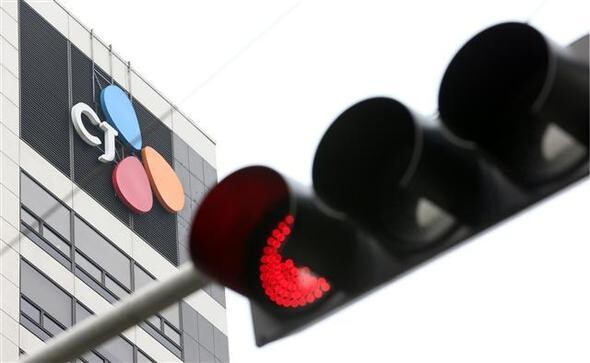hankyoreh
Links to other country sites 다른 나라 사이트 링크
CJ Group confirmed to have made millions in illicit gains

By Kim Jeong-pil and Lee Jeong-yeon, staff reporters
Prosecutors have confirmed that CJ Group earned millions of dollars from transactions using inside information after purchasing affiliate stocks through a paper company founded in the British Virgin Islands, a notorious tax haven.
They also found evidence that chairman Lee Jay-hyun, 53, transferred over 50 billion won (US$44.5 million) in secret bearer bonds to his two children. They are now investigating whether he endowed the gift illegally as a way of strengthening family control of the group.
According to May 22 accounts from the prosecutors, police, and the National Tax Service, the second special investigations division of the Seoul Central District Prosecutors’ Office, under chief Yun Dae-jin, is investigating the group for allegedly earning over 6 billion won (US$5.3 million) in illicit funds by purchasing 9 billion won (US$8 million) in affiliate stock through a Virgin Islands paper company and then selling it off based on undisclosed insider information.
Prosecutors are currently tracing the source of the funds used to purchase the stock, which they believe came from a secret offshore account of Lee’s. They also secured evidence that he purchased affiliate stocks in the name of an offshore corporation in Hong Kong, along with testimony from a group source who claimed that the Hong Kong branch head was administering Lee’s fund overseas.
Prosecutors are also investigating evidence that the group earned 30 billion won (US$26.7 million) illicitly while constructing its Dongtan Distribution Complex in Hwaseong, Gyeonggi Province. It is believed to have made the money by purchasing land for 50 billion won (US$44.6 million) as “project financing” through an offshore fund and then reselling it at a profit. The evidence suggests that the group used the Dutch-based fund Mark PFV as a front for the purchase, but prosecutors believe the funding actually came from CJ’s offshore accounts. Following a May 22 search of CJ Construction, they began analyzing bookkeeping entries and hard disk data on the transactions related to the construction of the Dongtan complex.
The prosecutors’ investigation is focusing on whether Lee evaded taxes by giving his two children 25 billion won (US$22.3 million) apiece from 50 billion won laundered into cash from bearer bonds purchased secretly some time around 2006. They are also looking into the group’s purchase of 110 billion won (US$9.8 million) in artworks through Gallery Seomi between 2006 and 2007 and tracking down the source of the funds.
Persecutors summoned several CJ employees including group finance team chief Sung, 47, to investigate the process by which the slush fund was made and wealth was increased.
On May 22, prosecutors sent investigators to the fourth audit bureau of the Seoul Regional Tax Office to obtain NTS audit records for the group since 2008.
A source with the prosecutors explained that they had “seized [information] related to possible tax evasion, with plans to investigate several possible lines of evidence and methods that may have been used.”
In 2008, the CJ Group paid more than 170 billion won (US$151.5 million) in taxes after a 44-year-old individual named Lee, who administered a secret fund for Lee Jay-hyun, was investigated by police in connection with a contract killing.
Please direct questions or comments to [english@hani.co.kr]

Editorial・opinion
![[Column] Has Korea, too, crossed the Rubicon on China? [Column] Has Korea, too, crossed the Rubicon on China?](https://flexible.img.hani.co.kr/flexible/normal/500/300/imgdb/original/2024/0419/9317135153409185.jpg) [Column] Has Korea, too, crossed the Rubicon on China?
[Column] Has Korea, too, crossed the Rubicon on China?![[Correspondent’s column] In Japan’s alliance with US, echoes of its past alliances with UK [Correspondent’s column] In Japan’s alliance with US, echoes of its past alliances with UK](https://flexible.img.hani.co.kr/flexible/normal/500/300/imgdb/original/2024/0419/2317135166563519.jpg) [Correspondent’s column] In Japan’s alliance with US, echoes of its past alliances with UK
[Correspondent’s column] In Japan’s alliance with US, echoes of its past alliances with UK- [Editorial] Does Yoon think the Korean public is wrong?
- [Editorial] As it bolsters its alliance with US, Japan must be accountable for past
- [Guest essay] Amending the Constitution is Yoon’s key to leaving office in public’s good graces
- [Editorial] 10 years on, lessons of Sewol tragedy must never be forgotten
- [Column] A death blow to Korea’s prosecutor politics
- [Correspondent’s column] The US and the end of Japanese pacifism
- [Guest essay] How Korea turned its trainee doctors into monsters
- [Guest essay] As someone who helped forge Seoul-Moscow ties, their status today troubles me
Most viewed articles
- 1[Column] The clock is ticking for Korea’s first lady
- 2Hong Se-hwa, voice for tolerance whose memoir of exile touched a chord, dies at 76
- 3After 2 months of delayed, denied medical care, Koreans worry worst may be yet to come
- 4[Column] Has Korea, too, crossed the Rubicon on China?
- 5[Correspondent’s column] In Japan’s alliance with US, echoes of its past alliances with UK
- 6US overtakes China as Korea’s top export market, prompting trade sanction jitters
- 7Samsung barricades office as unionized workers strike for better conditions
- 8All eyes on Xiaomi after it pulls off EV that Apple couldn’t
- 9More South Koreans, particularly the young, are leaving their religions
- 10John Linton, descendant of US missionaries and naturalized Korean citizen, to lead PPP’s reform effo